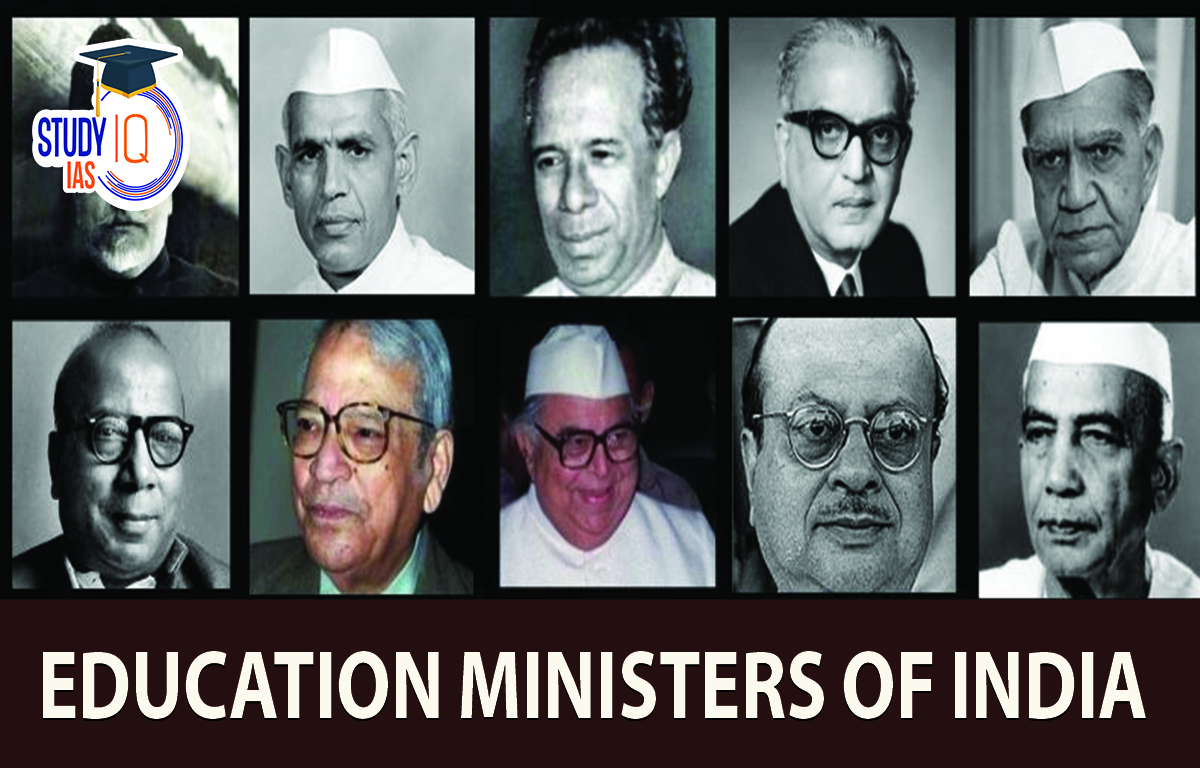Table of Contents
Literacy rates have increased from 12% to 75% in recent years after independence. Since India’s independence, the educational system has advanced, and this development can be attributed to our leaders’ enormous devotion and dedication to raising the standard of education that is provided. Up to this point, there have been over 30 different education ministers. They have all performed great work during their tenures as India’s ministers of education. On September 26, 1985, the Ministry of Education, which is in charge of carrying out the National Education Policy, was established in order to accomplish or better this purpose. The Ministry of Education has existed in India since 1947. The Rajiv Gandhi administration renamed the Ministry of Education to the Ministry of Human Resource Development (MHRD) in 1985. Later, after the current administration publicly unveiled its recently drafted “National Education Policy 2020,” the Ministry of Human Resource Development was changed back to the Ministry of Education. At the moment, it has two departments:
The Department of School Education and Literacy
This division deals with adult education, literacy, and basic, intermediate, and upper secondary education in India.
The Department of Higher Education
This division deals with technical education, scholarships, and other matters related to secondary, post-secondary, and university-level education. According to Section 3 of the University Grants Commission (UGC) Act, the department has the authority to confer presumed university status on educational institutions based on the recommendations made by the UGC of India. While the Department of School Education & Literacy is in charge of the country’s school education and literacy development, the Department of Higher Education is in charge of one of the largest higher education systems in the world, second only to the US and China.
List of Education Ministers of India from 1947-2024
Here’s complete Education Ministers of India List:
| Name of Education Minister | Term of Office |
| Maulana Abdul Kalam Azad | 15th August 1947 – 22nd January 1958 |
| Dr. K. L. Shrimali | 22nd January 1958 – 31st August 1963 |
| Shri Humayun Kabir | 1st September 1963- 21th November 1963 |
| Shri. M. C. Chagla | 21th November 1963- 13th November 1966 |
| Shri. Fakhruddin Ali Ahmed | 14th November 1966- 13th March 1967 |
| Dr. Triguna Sen | 16th March 1967- 14th February 1969 |
| Dr. V. K. R. V. Rao | 14th February 1969 – 18th March 1971 |
| Shri. Siddhartha Shankar Ray | 18th March 1971 – 20th March 1972 |
| Prof. S. Nurul Hasan | 24th March 1972- 24th March 1977 |
| Prof. Pratap Chandra Chunder | 26th March 1977 – 28th July 1979 |
| Dr. Karan Singh | 29 July 1979 -January 1980 |
| Shri. B. Shankar Anand | 14th January 1980- 18th October 1980 |
| Shri. S.B. Chavan | 17th October 1980- 8th August 1981 |
| Smt. Sheila Kaul | 10th August 1981- 31st December 1984 |
| Shri. K. C. Pant | 31st December 1984- 25th September 1985 |
| Shri. P.V. Narasimha Rao | 25th September 1985- 25th June 1988 |
| Shri. P. Shiv Shankar | 25th June 1988- 2nd December 1989 |
| Shri. V.P. Singh | 2nd December 1989- 10th November 1990 |
| Shri. Raj Mangal Pandey | 21st November 1990- 21st June 1991 |
| Shri. Arjun Singh | 23rd June 1991- 24th December 1994 |
| P.V Narasimha Rao (Repeated Twice) | 25th December 1994- 9th February 1995 |
| Shri. Madhav Rao Scindia | 10th February 1995- 17th January 1996 |
| P.V Narasimha Rao (Repeated Thrice) | 17th January 1996- 16th May 1996 |
| Shri Atal Bihari Vajpayee | 16th May 1996- 1st June 1996 |
| Shri. S.R. Bommai | 5th June 1996- 19th March 1998 |
| Dr. Murali Manohar Joshi | 19th March 1998- 22nd May 2009 |
| Arjun Singh (Repeated Twice) | 22nd May 2004 – 22nd May 2009 |
| Shri Kapil Sibal | 29th May 2009- 29th October 2012 |
| Shri. M. M. Pallam Raju | 30th October 2012- 26th May 2014 |
| Smt. Smriti Irani | 26th May 2014 – 5th July 2016 |
| Shri. Prakash Javdekar | 5th July 2016 – 30th May 2019 |
| Ramesh Pokhriyal | 30th May 2019- 7th July 2021 |
| Dharmendra Pradhan | 7th July 2021 – Present |
Current Education Minister of India?
Dharmendra Pradhan is an Indian politician serving as the Minister of Education and formerly the Minister of Skill Development and Entrepreneurship in the government formed after the 2024 Lok Sabha elections. He won the Sambalpur constituency in Odisha with 49.48% of the votes, while his main opponent received 39.47%. Pradhan has also held positions as Minister of Petroleum and Natural Gas and Minister of Steel. He represents Madhya Pradesh in the Rajya Sabha and was previously in the 14th Lok Sabha. He became the Minister of Education in July 2021.
- Born on June 26, 1969, in Talcher, Odisha, Pradhan is the son of Debendra Pradhan, a former Minister of State. He is known as the “Ujjwala Man” for his role in the Pradhan Mantri Ujjwala Yojana launched in 2016.
- Pradhan earned a post-graduate degree in Anthropology from Utkal University, Bhubaneswar, and has worked on youth issues like unemployment and skill development. He began his political career in 1983 as an ABVP activist and was later elected to the Lok Sabha in 2004 from Deogarh. He has received several awards for his contributions to society and politics.
First Education Minister of India
Abul Kalam Azad was the first Minister of Education in Independent India, Known as Azad, which means “free,” he greatly influenced India’s education system, leading to his birthday being celebrated as National Education Day.
At 35, he became the youngest president of the Indian National Congress in 1923. He played a significant role in the Dharasana Satyagraha in 1931 and was a strong advocate for secularism, socialism, and Hindu-Muslim unity. He served as Congress president from 1940 to 1945, during the Quit India Movement, and was jailed with other leaders. Through his journal, Al-Hilal, he promoted harmony between different communities.
Early Life
Maulana Abul Kalam Azad, originally named Abul Kalam Ghulam Muhiyuddin, was born on November 11, 1888, in Mecca, Saudi Arabia. His father, Maulana Khairuddin, was a well-known Islamic scholar who taught him in his early years. Inspired by modern thinkers like Sir Syed Ahmed Khan, Azad became a lively journalist in his teens and launched an Urdu newspaper called Al-Hilal, which was later banned by the British. He also became the president of the Indian National Congress twice, in 1923 and 1940.
Role in India’s Independence Movement
Azad was a key leader in the Indian independence movement. He actively participated in the Khilafat Movement from 1920 to 1924 and served as the president of the All-India Khilafat Committee. Influenced by Mahatma Gandhi, he took part in major movements like the Dandi March in 1930 and the Quit India Movement in 1942. He was imprisoned multiple times between 1920 and 1945 and played a crucial role in discussions about independence, strongly opposing the partition of India.
Contribution to Constitution Making
Azad was elected to the Constituent Assembly representing the United Provinces. He served on five committees and contributed to debates on national language and education. Although he spoke less in the Assembly, his leadership was vital in behind-the-scenes discussions.
Later Contributions
After India gained independence, Azad became the Education Minister, a role he held until 1958 in Pandit Jawaharlal Nehru’s Cabinet. He was instrumental in establishing the Indian Council for Cultural Relations (ICCR) to promote cultural exchanges with Eastern countries. Azad passed away on February 22, 1958, and was posthumously awarded the Bharat Ratna in 1992 for his contributions as a freedom fighter, journalist, scholar, and poet.
Writings
Fluent in several languages, including Arabic, Hindi, English, Urdu, Persian, and Bengali, Azad authored many books. He is best known for An Autobiographical Narrative, published after his death, along with other significant works like Gubar-e-Khatir, Azad on Pakistan, and Tazkirah.
First Female Education Minister of India
Anandiben Patel is a prominent figure in Indian politics, known for being the first woman Education Minister of India and the first female Chief Minister of Gujarat. An active member of the Bharatiya Janata Party (BJP) since 1987, she served as the Cabinet Minister for Education from 2002 to 2007, playing a significant role in shaping educational policies during her tenure.
| Early Life | |
| Name | Smt. Anandiben Mafatbhai Patel |
|---|---|
| Date of Birth | November 21, 1941 |
| Birth Place | Kharod, Bijapur Taluka, District Mahesana. |
| Permanent Address | ”Dharam’, near Shan Bungalows, Shilaj Ahmedabad. |
| Current Address | Raj Bhavan, Uttar Pradesh Lucknow |
| Education | MSc, M.Ed (Gold Medalist). |
| Occupation | Retired Principal (Mohinaba Girls High School, Ahmedabad) and Social Services |
| Literary Activities | Writing articles for ‘Earth’, ‘Sadhana’ and ‘Sakhi’ magazines from time to time. |
| Interests | Study, Writing, Travel, Public Relations. |
| Published Books | • ‘A mane hamesha yaad raheshe’ (Gujarati Edition). • ‘Prayas’ • ‘Pratibimb’ |
| Particulars | Details |
| Parliamentary Life |
|
| Political Activities |
|
| Achievements during Chief Minister’s Tenure |
|
| Honors / Awards |
|
| Foreign Travel |
|
Education Minister Objectives
The National Education Policy focuses on improving education quality and access, particularly in underserved areas. It supports disadvantaged groups like the poor, women, and minorities, and offers financial help such as scholarships and loans for students from marginalized backgrounds. By promoting international collaboration in education with UNESCO and other countries, India aims to tackle the challenges of accessibility and quality in its education system. Education is key to national growth, and the Education Ministry plays a crucial role in managing the system to meet the population’s needs.


 Serious Fraud Investigation Office (SFIO...
Serious Fraud Investigation Office (SFIO...
 Article 142 of Indian Constitution, Sign...
Article 142 of Indian Constitution, Sign...
 Pakistan-Occupied Kashmir (PoK): History...
Pakistan-Occupied Kashmir (PoK): History...





















